
Even though we’ve got just a few more days left of 2023, it feels as though the year is ending a little too early. I need to see more movies.
Oh, I’ve seen plenty of movies—more than 130, easy. And I’ve liked and appreciated many of them. But I’ve not loved very many—a wildly subjective but, for me, important criteria.
And here at Watching God, most of the movies that land on my top 10 should ideally come with a hint of spirituality, too: God lurking around the corner. This year, some of my favorite films were defined as much by His apparent absence more than His presence.
And yet, the year’s best films still offer power and poignancy. All have content issues, as I pointed out in my Plugged In reviews of them, and viewers should not just sit down and watch any of them without weighing those considerations.
But even in movies where God seems like He left the building, we can still find elements that point to Him all the same. So with the preamble out of the way, let’s dive in.

- The Zone of Interest (PG-13)
After all these years, Hedwig Höss (played by Sandra Hüller) finally has the life she always dreamed of. Her house is big and stuffed with servants. Her gardens are filled with sweet-scented flowers and the laughter of her children. And her husband, Rudolf, works just next door—as the commandant for the Auschwitz concentration camp.
God is rarely mentioned in The Zone of Interest. And surely, on the other side of Hedwig’s garden wall, many must wonder if He deserted them entirely. But this movie reminds us that evil isn’t just the province of movie monsters and psychotic killers; it is found in beautiful gardens, too. Hedwig is no Balrog, no Michael Myers. But in her selfishness and disregard for the horrors around her, she feels in many ways the most evil—in part, because she’s not so far removed from us.
One other note: Shortly before I saw The Zone of Interest, I watched another film set in part in a concentration. It was The Hiding Place, a 2023 stage-to-film adaptation of the Corrie ten Boom story. Corrie ten Boom (played by Nan Gurley) was never in Auschwitz. But because she and her family sheltered Jews in the Nazi-occupied Netherlands, she survived other Nazi concentration camps and jails. And even though she was a committed Christian, Corrie’s own faith was shaken by the deprivations and tragedies she experienced. But as we watch Corrie’s story unfold in this effective production, we see God at work even here.
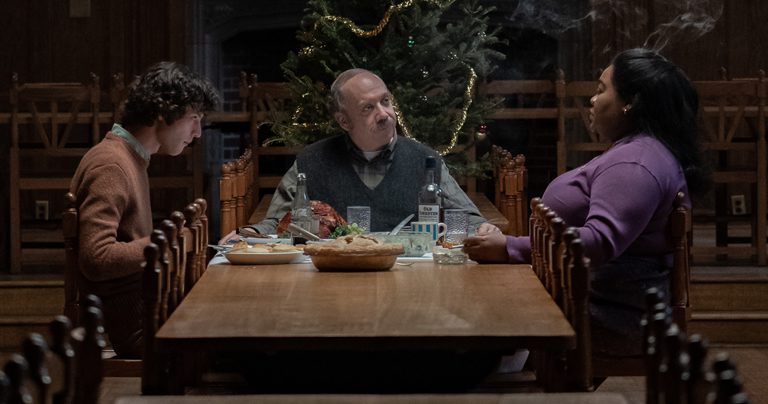
- The Holdovers (R)
Remember how, in Charles Dickens’ A Christmas Carol, a young Ebenezer Scrooge gets nearly left behind at school over the holidays? That scenario is essentially the setup for The Holdovers, a 1970s-inspired dramedy of three lonely folks who’re stuck with each other over Christmas at a posh prep academy.
Troubled student Angus Tully (Dominic Sessa) thought he was going on vacation with his family. But his recently re-wed mother yanks away the invite at the last minute, preferring to spend a cozier Christmas with Agnus’ new stepfather instead. Mary Lamb (Joy Randolph) is mourning the death of her only son in Vietnam. And, well, professor Paul Hunham (an excellent Paul Giamatti) has no one who he’d like to spend Christmas with—or any other day, for that matter. If he must suffer over the Christmas holiday, why not inflict a little suffering on everyone else?
If The Zone of Interest is about a very human sort of evil, The Holdovers digs into a very human sort of brokenness. They’ve suffered mightily during their lives, and it makes each of them (at least Paul and Angus) very difficult to like, much less love. But just as Christmas represents light and hope in the darkest of times, these broken people find hope, too. Connection. Maybe even something akin toward love. And while Paul is a passionate, outspoken atheist, you can still see a bit of spiritual redemption leak through the cracks in The Holdovers.
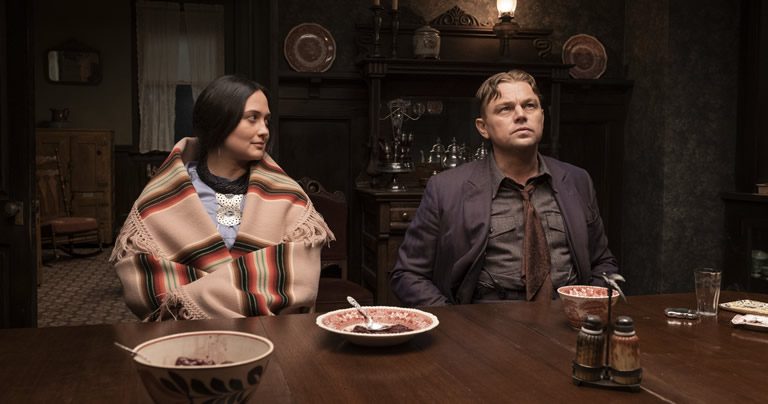
In The Zone of Interest, Hedwig Höss gave us a picture of an unrepentant, uncaring villain. Ernest Burkhart from Killers of the Flower Moon is more complex—fitting for this relatively complex, and true, story.
Ernest (Leonardo DiCaprio) works for his wealthy uncle, William “King” Hale (Robert De Niro), in the middle of the Osage Nation in Oklahoma. The Osage became incredibly wealthy after oil was discovered on their land, which gives them (certainly compared to other Native American people at the time) power and leverage. But the Osage are dying—sometimes from mysterious diseases, sometimes from horrific “accidents,” sometimes from outright, obvious murder. Even though King Hale represents himself as the best friend the Osage ever had, we learn otherwise. Ernest becomes something akin to King’s hatchet man.
But Ernest also marries an Osage woman, the resourceful and devout Molly Burkhart (Lily Gladstone). And he seems, in a way, to love both her and their children. But he loves money, too, and he’s willing to do anything to get it. Killers of the Flower Moon, directed by Martin Scorsese, doesn’t just tell us a tragic and often overlooked chapter in American history: It gives us a story of sin, and how our own weaknesses can lead to unimaginable corruption and evil. And while Killers of the Flower Moon is more than three hours long, it’s worth every minute of it.
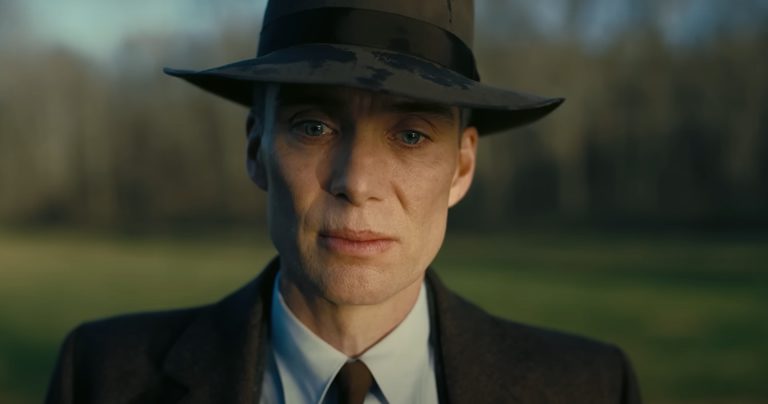
- Oppenheimer (R)
Robert Oppenheimer (Cillian Murphy) was sometimes called a prophet by his fellow physicists. And in a way, he bears a strong resemblance to the Old Testament prophets of old. Like Elijah in his showdown with the prophets of Baal, the father of the Atomic Age brought fire and destruction down upon his enemies. Like Isaiah and Jeremiah and countless others, Oppenheimer warned his own country about its wayward ways (at least, wayward in Oppenheimer’s view). And, like so many prophets of old, Oppenheimer was defamed and rejected for speaking out.
There’s one big difference, of course: While the prophets in the Old Testament believed in God and encouraged everyone in earshot to return to Him, Oppenheimer doesn’t seem particularly religious. But you could argue he does play God—leading scientists in the effort to harness great and unimaginable power. “Now I become death, the destroyer of worlds,” Oppenheimer intones at one point—a quote pulled from the sacred Hindu text Bhagavad Gita. And we continue to live underneath that dangling sword that Oppenheimer helped forge.

- The Mission (PG-13)
John Chau lived for Jesus. And he died trying to bring Jesus to a people who didn’t want to hear about Him.
The Mission, from National Geographic, is the best documentary I’ve seen this year—and the most challenging. It’s about Chau and his multi-year personal crusade to bring the gospel to North Sentinel Island, where a group of people largely untouched by the modern world live. The North Sentinelese have made it repeatedly clear that they don’t care for visitors, and it’s illegal to go there. But Chau believed that the North Sentinelese, like everyone else, needed Christ. If Jesus is the only way to salvation, as Christian doctrine asserts, wouldn’t the people be benefitted by learning about Him? Wouldn’t it be worth the risk to try?
The Mission serves us plenty of viewpoints—from explorers and anthropologists, from former missionaries and current pastors and, most especially, Chau’s own friends. And for those of us who share Chau’s faith, the doc comes with powerful, and provocative, questions.
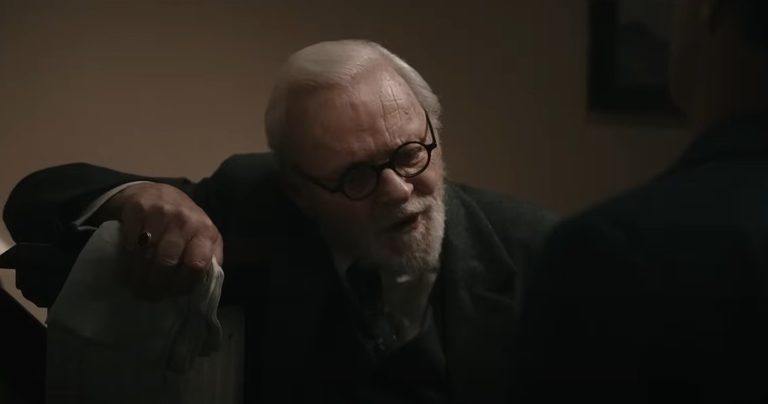
- Freud’s Last Session (PG-13)
What if Sigmund Freud and C.S. Lewis got together and debated the existence of God? That’s the setup for Freud’s Last Session—a movie based on a stage play that, in turn, was based on Armand Nicholi’s book The Question of God.
Freud’s Last Session finds England on the brink of World War II. Freud (Anthony Hopkins), living in London after escaping Nazi-occupied Austria, is dying of cancer. Lewis (Matthew Goode) is an up-and-coming Oxford don, his greatest works still in front of him.
“Why someone of your supreme intellect would suddenly abandon truth and then embrace a ludicrous dream?” Freud thunders. “An insidious lie?”
“And what,” Lewis counters, “If it isn’t a lie?”
The day-long debate touches on more than religion, but it stands at its center and becomes the pivot point for everything else. And while it seems unlikely that either man changed the other’s mind, it makes for a riveting dialogue. Both men score points and, in watching these two intellectual titans go toe-to-toe, it’ll give both agnostics and the devout something to think about.
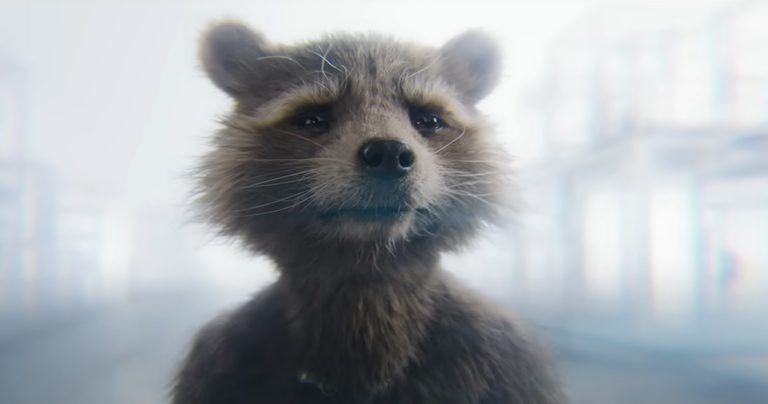
- Guardians of the Galaxy Vol. 3 (PG-13)
It’s been a down year for superhero movies, and the Marvel Cinematic Universe—after 15 years of unprecedented success—is showing its age. Guardians of the Galaxy Vol. 3 was the MCU’s sole big-screen triumph, and it owes its narrative success to its spiritual themes.
The story’s Big Bad is the High Evolutionary (Chukwudi Iwuji), who is continually trying to “perfect” creation through a process of destruction and rebuilding. Only the Guardians—practically models of imperfection—stand in his way. And that team includes one of the Evolutionary’s own creations, Rocket Raccoon (voiced by Bradley Cooper).
While this isn’t the best Guardians movie, it is perhaps the most poignant. Rocket’s tragic, triumphant story arc reminds us that evolution isn’t enough to make us who we are: We are creatures of soul and spark—imbued with a majesty that only a majestic Creator could give us. And it reminds us that God made us not just in His own image, but He made us to be unique. And what the High Evolutionary might see as flaws, God might see as our strongest attributes.
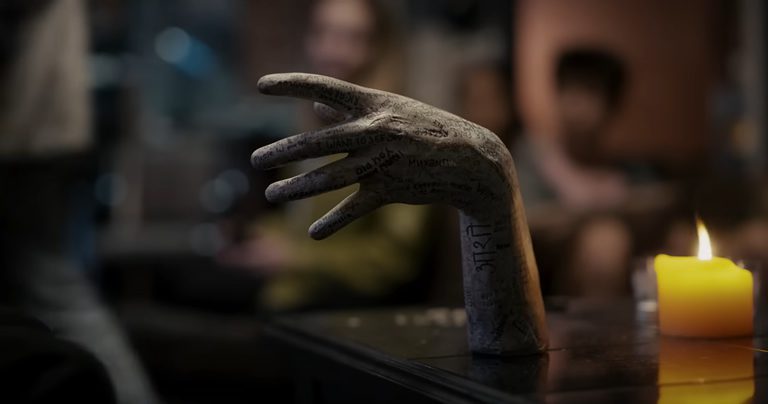
- Talk to Me (R)
For all their obvious shortcomings, horror movies are often inherently spiritual. Why, many of them boast literal spirits! And when it comes to big issues—the nature of evil or the reality of the human soul, for instance—no other genre can address them so directly as an effective fright flick.
Talk to Me is an effective fright flick, no question—the scariest movie of the year. Its centerpiece is a strange, disembodied hand covered in symbols. And underneath its casing, a once-living appendage is said to sit beneath. Where did it come from? No one knows. But participate in an eerie-yet-simple ritual and hold that hand, and you’ll meet … people. Long dead people, people up to no good.
Talk to Me, fittingly, speaks to a couple of major points that my Sunday School teachers always warned me about. Don’t fool around with the occult, they said, and you want to go to heaven—not that other place. The people met through the hand are in that “other place.” And they will do whatever they can to get what they want. And what do they want? Well, us, it would seem. While this is certainly not a theologically deep or consistent film, it’s a powerful, sometimes disgusting rumination on temptation, and it tells us that when we knock on secret, forbidden doors, something just might be listening on the other side.
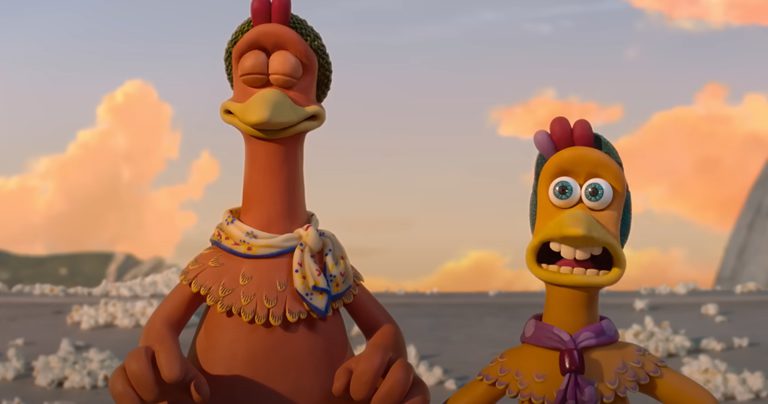
It’s been 23 years since Ginger, Rocky and their fowl-onious cohorts escaped Mrs. Tweedy’s pastry plots in the original Chicken Run. And since then, they’ve had a good run themselves in a sort of an island chicken utopia. They even have a daughter—the ever-precocious Molly. But Molly wants to leave the island and see what else the world might hold. And when she spies a van festooned with an obviously happy chicken sitting in a bucket, she’s just got to find out what makes that bucket so enjoyable.
It’s sort of weird to think how much Talk to Me and Chicken Run: Dawn of the Nugget have in common. Dawn of the Nugget warns of sneaky temptations. It plays on afterlife concepts, too—and that the “afterlife” might not be all that pleasant. While Talk to Me takes us into an all-too-real hellish world of desperate and single-minded souls, Dawn of the Nugget has many of its chickens turn into zombies of their former selves, stumbling around aimlessly and gobbling up all the grain they can cram toward their gizzard—all while awaiting their Great Reward. And what is that reward? They ride up an escalator and into a fake sunset … where they’re promptly chopped up into chicken bits.
Yep, it’s like Talk to Me and Chicken Run: Dawn of the Nugget are practically the same movie.
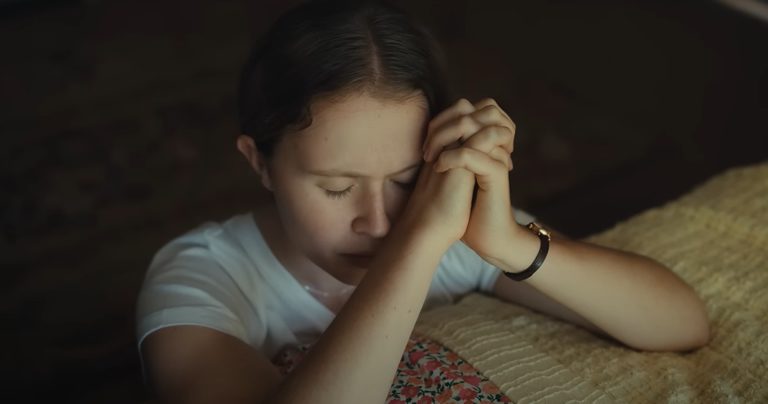
Released to little fanfare this July, The Starling Girl made just a little over $161,000 at the box office. I might be one of the only folks who might’ve seen it. But those that have seen it appreciated it: The Starling Girl has a 92 percent “freshness” rating on Rotten Tomatoes, higher than many of the year’s Oscar hopefuls. The film delves into religion—and how it can be abused.
Jem Starling (Eliza Scanlen) is a free-spirited young woman who loves God but also falls head-over-heels for her youth pastor—the young and married Owen Taylor (Lewis Pullman). Those two powerful affections pull at Jem’s heart and soul—but the flesh-and-blood infatuation ultimately wins, with Owen telling her that their relationship (and his infidelity) is actually part of God’s plan. “I want so much for you, and when I’m with you I want so much for me, too,” Owen tells her. “I never felt that with anybody. How could God not want that?”
That’s a lie, of course—and it’s far from the only one Jem absorbs from both Owen and the fundamentalist congregation to which she belongs. Jem, not Owen, is deemed the biggest sinner here (never mind that Jem is also underage). The Starling Girl is more complex than that, though: It explores big issues and the all-too-common human dynamics of sex, power and faith. It’s not an easy watch. But it’s worth watching all the same.













